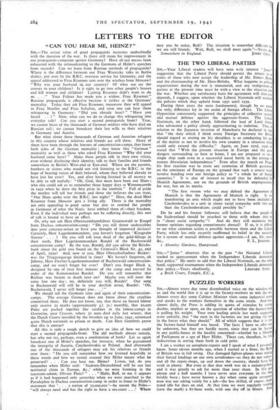LETTERS TO THE EDITOR " CAN YOU HEAR ME, HEINZ
? "
Snt,—The actual value of good propaganda increases undoubtedly with the duration of the war. Is there still room for improvement in our propaganda-campaign against Germany? Have all our means been exhausted with the rebroadcasting to the Germans of Hitler's speeches from records? Can we learn from Russian methods of propaganda? Where is the difference between our Frau Wernicke talks in Berlin dialect, put over by the B.B.C. overseas service for Germany, and the appeal addressed to Frau Kraemer sent over the wireless from Moscow? " Why was your husband in. our country? Of what use are the crosses to your children? Is it right to go into other people's houses and kill women and children? Ludwig Kraemer didn't want to do so. . . ." Your Filluer has made you a widow, Frau Kraemer." Russian propaganda is effective because it strikes at the Germans' mentality. Today they ask Frau Kraemer, tomorrow they will appeal to Frau Mueller and Frau Schultze, and soon one can hear them whispering in Germany: " Did you already hear? " " Have you heard . . ? " Now, what can we do to change this whispering into everyday talk? Can you start a second propaganda front? True, we cannot boast of the thousands of German soldiers who have tiled on Russian soil ; we cannot broadcast their last wills to their relatives in Germany and Austria.
But what about those thousands of German and Austrian refugees in this country whose relatives and friends are still there. Many of them have been through the horrors of concentration-camps, they know both sides of the German mentality ; they know this " German " mentality as well as those who asked Frau Kraemer " Why did your husband come here? " Make these people talk in their own voices, even without disclosing their identity; talk to their families and friends somewhere in Berlin's West-end or East-end. Where are the parents, brothers or sisters who would not risk listening to the B.B.C. in the hope of hearing voices of their beloved, whom they believed already to have lost for ever? Yes, and after having listened in all secrecy to be able to tell joyfully : " Oh, God, that must have been our Hans ; who else could ask us to remember those happy days at Warnemuende in 1932 when he drew the first prize in the tombola " Full of pride the mother will tell her friends and those she believes she can trust, "Our Hans spoke over the B.B.C. last night! " Here, the dead Herr Kraemer from Moscow gets a living ally. There is the mentality not only appealing to good sense but also to remind the people in Germany of what the Nazis have robbed them of—their freedom. Even if the individual may perhaps not be suffering directly, this sort of talk is bound to have an effect.
Or, why not ask Herr Oberstunnbarmfiihrer Gruenewald or Koegel from Dachau concentration-camp: " Do you still throw undesirables into your concrete-mixer or have you thought of improved devices? Certainly, Herr Lagerkommandant, you haven't forgotten Kiesgrube Stever' . . . ? Do you still rob your dead of the gold-fillings in their teeth, Herr Lagerkommandant Roedel of the Buchenwald concentration camp? By the way, Roedel, did you advise the Reichs- bank about the gold you found on the Criminal's Block Nr. 45, end of April, 1939? And, now to you, Herr Oberscharfuehrer Becker: was the Truppengarage finished in time? We haven't forgotten, oh Johnny, Herr Zweiter-Lagerkommandant of Buchenwald concentration- camp, and we won't forget for ever! Don't you forget Block 3, designed by one of your first inmates of the camp and erected by order of the Kommandant Roedel. Do you still remember that Richter was beaten to death later on? Maybe you will meet the
same fate one day ; no, definitely you will, Roedel! Our song in Buchenwald will still be in your devilish mind, Roedel: Oh, Buchenwald, I never will forget you . . "
We should tell the Germans time and again of their concentration- camps. The average German does not know about the cruelties committed there. He does not know, too, that those on forced labour only receive 25 marks (approximately Li 5s.) monthly, that 20,000 Poles are packed together like sardines in the labour-camps in Oswiecim, near Cracow, where 3o men died daily last winter, that the Dutch Courts installed by the invaders up to June, 1941, sentenced 4,000 Dutch nationals to prison or death. Can Herr Goebbels prove that this is untrue?
All this is only a rough sketch to give an idea of how we could start a second propaganda-front. The old methods always remain, but why not try, perhaps, even a combination of both? Let us again broadcast one of Hitler's speeches, for instance, when he guaranteed the intergrity of Austria, Czechoslovakia or Poland. And afterwards one of the thousands of refugees may ask his relatives or friends over there : " Do you still remember how we listened hopefully to these words and how we rested assured that Hitler meant what he promised? . . . Can you hear me, Heinz? Listen, lad, do you remember when Hitler said: Sudeten-Deutschland will be our last territorial claim in Europe, &c.,' while we were listening in the icecream-saloon, Olivaer Platz? " . . . " Halo, Rolf, to me it appears as if it had happened only yesterday when we were marched to the Paradeplatz in Dachau concentration-camp in order to listen to Hitler's statement that . . a nation of 35,000,000 '—he meant the Poles- ' will always need and has the right to have a sea-coast . . : Where may you be today, Roll? The situation is somewhat different h: we are still friends. Wait, Rolf, we shall meet again."—Yours,


























 Previous page
Previous page